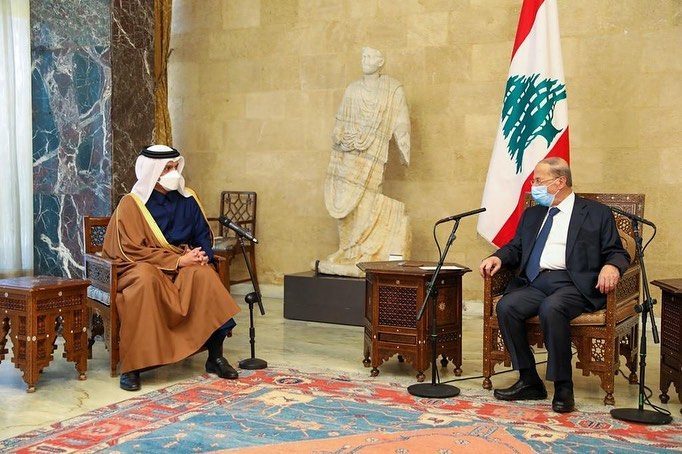The Qatari Deputy PM visits the Lebanese President, Michel Aoun, in Baabda to discuss government formation and economic aid.
Qatar’s deputy prime minister landed in the Lebanese capital for a meeting with Lebanon’s President Michel Aoun at his official residence, authorities confirmed.
Sheikh Mohammed bin Abdulrahman Al-Thani’s visit to Beirut was no more than a solidarity visit to support the crises-hit country through a political deadlock that has impeded the formation of a government.
“The Qatari Amir sends a message of support to the Lebanese people and encourages them to prioritise their national interest over their personal one,” the FM, who also serves as Qatar’s minister of foreign affairs, said during the meeting at the Baabda presidential palace.
“Qatar encourages Lebanon to form a new government and heal the rift between all political parties preluding to opening a door for economic aid to solve the current crisis,” he added.
The Qatari minister also confirmed “all the countries that we are communicating with now support the forming of a new government in Lebanon.”
Lebanese journalist and political analyst, Daoud Rammal, who was in Baabda during the meeting told Doha News that Sheikh Mohammed’s visit to Lebanon was a “solidarity visit and not a political one.”
The Qatari official said in a press conference after meeting that the issue of the government formation remains an internal matter, noting Doha is on good terms with all parties.
However, he also said “Qatar will support any path that leads to forming a new government in Lebanon, and we do not seek to torpedo the French initiative.
“We are working to complete the international efforts to form the Lebanese government,” he continued.
Commenting on the visit, Rammal said the Qatari minister tied aid to Lebanon with the government formation and affirmed that Qatar’s visit and the French initiative aligns rather than interferes.
“Qatar will not be depositing fresh dollars into the state’s treasury as many anticipated. Instead, the Qatari government will support Lebanon through investing in all sorts of projects that aim at reviving the country and its economy.”
The last visit of the Qatari foreign minister to Lebanon was on August 24, just days after the Beirut port explosion, which left many dead and devastated the entire city.
Lebanon has been struggling to deal with an economic crisis as well as severe political polarisation that has hindered the country’s ability to form a new government.
Since the Diab government resigned six days after the port blast, political factions across the country have been unable to come to a consensus.
Talks for the rapid formation of a new cabinet come amid calls to revive the stalled French initiative that has been described by some as Lebanon’s only saviour. With the Qatari senior official’s visit, questions have been raised over Doha’s intentions.
However, Lebanese political commentator, Radwan Akil told Doha News that the visit is not linked to the French initiative.
“I don’t believe the Qatari visit interferes with the French initiative, despite what many have claimed, purely based on recent sensitivities between France and Qatar. If the initiative is enforced, I anticipate that Qatar will be happy for Lebanon,” he said, referring to recent tensions that included calls to boycott French products over President Emmanuel Macron’s anti-Islam remarks.
Read also: Qatar to rebuild Beirut schools following devastating port blast
Lebanon is currently wrangled in multiple crises, including a surge in COVID-19 infection that has forced the country into lockdown.
This has exacerbated an unprecedented financial downturn as the currency hits new lows, banks remain paralysed and at least half of the population facing poverty.
Foreign countries that once intervened in attempts to assist the country have made it clear that they will not bail out the heavily indebted state without major reforms.
However, Akil said “Qatar plays a major role in the Lebanese political environment and it has always been supportive of Lebanon and the Lebanese community throughout previous wars and crises.”
Meanwhile, other analysts have noted Qatar’s unique position to act as a mediator between the different regional and international powers all vying for influence in Lebanon.
Doha enjoys good relations with Washington, Tehran and can use those to bridge gaps between both, as well as other major players like Saudi Arabia and Turkey.
Local Lebanese reports suggest the cabinet is awaiting the return of former Prime Minister Saad Hariri from a trip abroad to take on the political deadlock. Hariri is expected to chart out a political course that is expected to set the foundation to form a new government.
Follow Doha News on Twitter, Instagram, Facebook and Youtube







